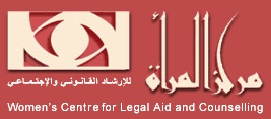Forced Evictions: Assessing the impact on Palestinian Women in East Jerusalem
 Women’s Centre for Legal Aid and Counselling (WCLAC)
Women’s Centre for Legal Aid and Counselling (WCLAC)
Press Release
FOR IMMEDIATE RELEASE
Palestinian women suffer specific consequences of forced evictions in East Jerusalem caused by certain Israeli policies which must end.
The Women’s Centre for Legal Aid and Counselling (WCLAC) has issued a report highlighting the gender-specific impact that Israeli policies in East Jerusalem have on the lives of Palestinian women. WCLAC calls upon Israel to end forced evictions and home demolitions and makes recommendations to the international community and other actors to alleviate the situation of affected Palestinians.
“Using feminist and legal research methodology, this report shows the particular ways in which women are affected by forced evictions here,” said WCLAC’s General Director, Maha Abu Dayyeh. “The report comes at a critical moment as Israeli pressure on East Jerusalem seems to be increasing. These women’s testimonies must convince key actors to abide by and enforce international legal standards.”
The report has been issued by WCLAC’s International Humanitarian Law (IHL) Project. The IHL Project situates the human stories of Palestinian women within the context of their legal rights which are systematically denied by Israeli policies and practices of occupation.
Focusing on the experiences of Palestinian women in East Jerusalem, this WCLAC report presents testimonies from affected women, together with analysis of 13 selected case studies of living with the threat or event of forced eviction. The legal rights at stake in such cases include the right to adequate housing, the right to freedom from unlawful and arbitrary interference with the home, and to freedom from discrimination in the exercise of these rights.
The report addresses, in turn, living with the threat of eviction, the eviction or demolition process itself – including economic loss and physical injury – and the denial of rights after eviction. The report documents the ways in which women are particularly affected by forced eviction, charting the gender-based violence surrounding the event, the psychological effects, loss of social and economic status, loss of privacy and independence, and deterioration in family relationships.
The case studies show that forced eviction has a lasting impact on women’s lives and that it is not limited to a single geographical area of East Jerusalem. Families live under intense pressure, sometimes for years, being threatened with eviction or with their homes under threat of destruction. As this report shows through wide-ranging case studies, people from areas such as Al-Ashkariya, Jabbal Al-Mukabber, the Old City of Jerusalem and Al-Isawiya as well as from Sheikh Jarrah and Bustan/Silwan are all affected by forced eviction.
Amani S, from Jabbal Al-Mukabber, is among the women who describe the lasting impact forced eviction has had on their life. “I’ve lost my independence and I’ve lost my privacy. I used to wear short sleeves in the house and go without my headscarf. Now I always have to worry about what I am wearing because I’m living with other people. . . I have no privacy or time or space to myself at all.”
The report can be downloaded here or can be found on the WCLAC website.
